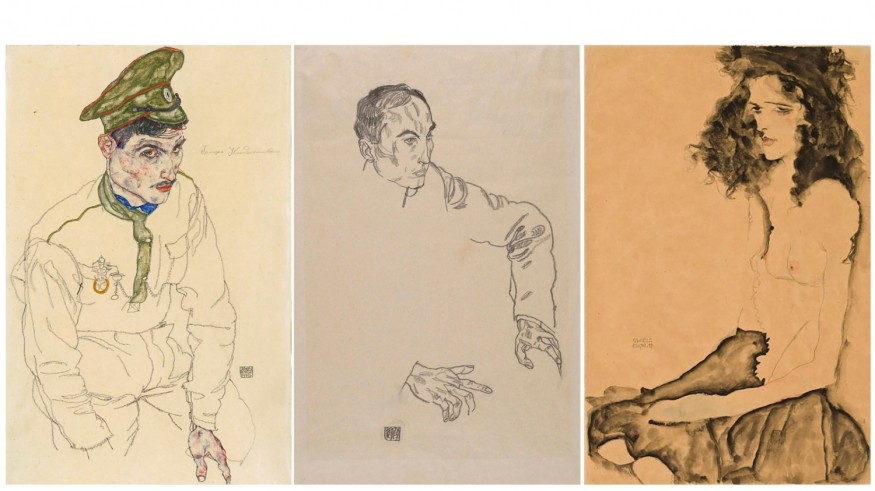Two Artworks Returned to Holocaust Victim’s Heirs, Third Piece Tangled in Court Battle

Prosecutors in New York have successfully aided in the return of two works of art that Nazis had taken from Jewish Holocaust survivor and collector Fritz Grünbaum. This is a significant step towards justice. The paintings "Portrait of a Man" from the Carnegie Museum of Art and "Girl with Black Hair" from the Oberlin College Allen Memorial Art Museum were estimated to be worth a combined $2.5 million. Nevertheless, a legal battle over the return of "Russian War Prisoner," the third piece by Austrian expressionist Egon Schiele, presently housed at the Art Institute of Chicago amid this victory.
Fritz Grünbaum's Story
Fritz Grünbaum, the son of a Jewish art dealer and a law school student, began his career in cabarets in Vienna in 1906. As the Nazis ascended to power, he openly mocked them, demonstrating defiance even on darkened stages. In 1938, Grünbaum was captured by Nazi officials who, through coercion, compelled him to grant power of attorney to his wife. Subsequently, his wife was forced to sign away Grünbaum's extensive art collection, including approximately 80 works by Egon Schiele, to Nazi officials. Some of the looted art was sold to fund the Nazi war effort. Both Elizabeth and Fritz Grünbaum tragically perished in concentration camps.
Also Read : El Departamento Unveils Tubular Stainless-Steel Brilliance in PJ. Lobster's Barcelona Optical Boutique
The Legal Battle
Manhattan prosecutors contend that the stolen artworks resurfaced in 1956 in Switzerland, part of a dubious art deal involving former members of the Nazi regime, leading to their eventual sale in New York galleries. While ten of Schiele's works have been successfully returned to the Grünbaum family, "Russian War Prisoner" remains in the possession of the Art Institute of Chicago, claiming its legal acquisition.
Grünbaum's heirs have expressed gratitude to Oberlin College and the Carnegie Institute for surrendering the recovered artworks, emphasizing that justice has prevailed. Timothy Reif, Grünbaum's great-grandnephew and a federal judge in New York City, hailed the restitution as a victory for justice and the memory of a courageous artist and anti-Fascist.
Previous Legal Decisions
In 2018, a New York judge ruled that two other Schiele works had to be returned to Grünbaum's heirs under the Holocaust Expropriated Recovery Act passed by Congress. Art dealer Richard Nagy, who claimed rightful ownership, argued that Grünbaum's sister-in-law had sold the artworks voluntarily after his death. The judge, however, dismissed this argument, stating that it was a "signature at gunpoint," underscoring the coercion involved in the transaction.
Dispute Over "Russian War Prisoner"
The Art Institute of Chicago challenges the restitution of "Russian War Prisoner," asserting lawful ownership based on extensive provenance research. A spokesperson for the institute, Megan Michienzi, cited a 2010 ruling by a federal judge, which explicitly stated that Grünbaum's Schiele art collection was not looted and remained in the family's possession, sold by Fritz Grünbaum's sister-in-law.
In a separate federal civil court case, Grünbaum's relatives sought the return of a "Russian War Prisoner." Still, the Art Institute of Chicago successfully had the case dismissed in November on technical grounds. The family missed a lawsuit deadline under the Holocaust Expropriated Recovery Act, as argued by the institute.
Current Developments
Following the dismissal of the civil court case, the Manhattan District Attorney's office, led by Alvin Bragg, sought court authorization earlier this month for the return of "Russian War Prisoner." The legal battle for the third artwork remains unresolved, leaving the Grünbaum family and prosecutors determined to pursue justice for Fritz Grünbaum's legacy.
The restitution of two artworks to Fritz Grünbaum's heirs marks a significant victory in the ongoing struggle for justice concerning Nazi-looted art. But the ongoing legal dispute over the third piece of art, "Russian War Prisoner," highlights how complicated these cases can be. In this case, the verdict will surely establish precedents for more attempts to recover artworks taken during one of the darkest periods in art history, even as the industry struggles with the moral and legal ramifications of restitution.
From Digital Models to 3D-Printed Homes: Jaspreet Kaur Lall Explains How the Innovation Changes the Construction Industry

Future Belongs to Green Construction: Sampath Kumar Paspunoori Explains One of the Key Trends in the Construction Industry

Kamala Harris' Campaign Ad Uses Iconic Visuals from Carrie Mae Weems to Connect with Voters

Historic Ancient Roman Ruins in Baalbek Remain Strong After Israeli Air Strikes; Locals Seek Cultural Protection

4 Ways to Honor Departed Loved Ones in Your Home Design













